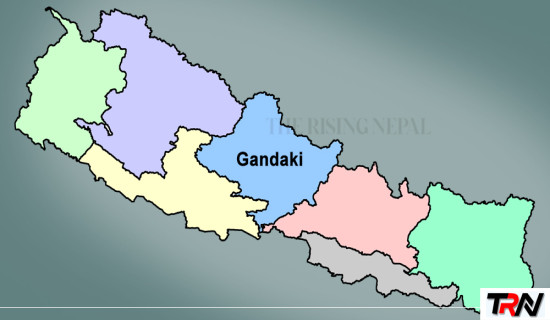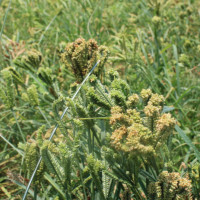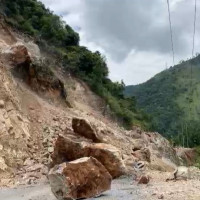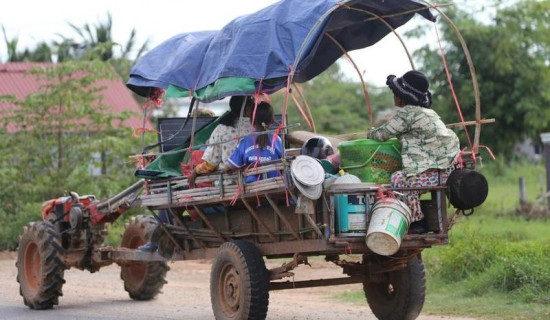- Saturday, 2 August 2025
Karnali gets 4 Chief Ministers, 51 ministers in 7 years
BY KAMAL SHARMA/NABIN SUBEDI,Surkhet. Aug. 9: Karnali Province has received four chief ministers and 51 ministers within seven years since federalism came into effect.
Provincial governments formed after the implementation of federalism are influenced by political upheavals at the central level.
In the first provincial assembly election of 2017, after the promulgation of new constitution , 33 out of 40 provincial members were elected from the then Communist Party Nepal formed with the alignment of the Maoist Centre and UML. Of 33 members, 23 were elected directly while 10 were elected through proportional representation.
When the UML had a single-party majority with 21 members in the provincial assembly, Mahendra Bahadur Shahi, a leader from the Maoist Centre of the left alliance, became the Chief Minister on February 15, 2018.
Despite the UML having a single-party majority, the Maoist Centre got the position of Chief Minister due to power-sharing at the centre.
During his nearly three-year tenure, Chief Minister Shahi appointed 13 ministers at various times. In the UML-Maoist government, Chief Minister Shahi’s cabinet included Dal Rawal, Prakash Jwala, Khadka Khatri, Nanda Singh Budha, Bimala KC and Naresh Bhandari.
Despite winning only one seat out of the 24 provincial electoral constituencies in Karnali Province, the Nepali Congress too obtained the Chief Minister’s position. Jeevan Bahadur Shahi, a central member of the Nepali Congress, elected from Humla district’s Provincial Constituency (B), served as Chief Minister for 16 months.
During his 16-month tenure, he appointed 14 members of the provincial assembly as ministers. His cabinet included Yagya Bahadur Budha Chhetri, Him Bahadur Shahi, Padam Bahadur Rokaya, Chandra Bahadur Shahi, Bindaman Bista, non-parliamentarian Karchen Lama and Ganesh Prasad Singh.
In the second reshuffle of his cabinet, Yagya Bahadur Budhathoki, Chandra Bahadur Shahi, Hima Bahadur Shahi and Padam Bahadur Rokaya were reappointed, while Krishna Shah, Bir Bahadur Shahi and Rato Kami were appointed as ministers for the first time.
Rushing to become ministers led to floor-crossing
After the split between the CPN-UML and Maoist Centre, the CPN-UML withdrew its support to Chief Minister Mahendra Bahadur Shahi. Following the withdrawal, four provincial assembly members from the CPN-UML Prakash Jwala, Ammar Bahadur Thapa, Kurma Raj Shahi and Nanda Singh Budha saved the government of Chief Minister Shahi by crossing the floor. They had given vote of confidence to Chief Minister Shahi. After that, Chief Minister Shahi appointed them as ministers for six months for crossing the floor and saving his government.
All Provincial Assembly Members became ministers
In the Karnali Provincial Assembly, all members of the CPN (Maoist Centre) have had the opportunity to become ministers. Except for two members, Thammar Bista and Dharam Raj Regmi, who joined the CPN-UML after the CPN split and Deputy Speaker Pushpa Gharti Bista, ten other members have taken turns becoming ministers. In Chief Minister Mahendra Bahadur Shahi’s cabinet, Naresh Bhandari and Bimala KC served as ministers. In Jeevan Bahadur Shahi’s cabinet, Gopal Sharma, Bindaman Bista, Karchen Lama (non-parliamentarian), Ganesh Prasad Singh, Krishna Shah, Bir Bahadur Shahi and Rato Kami served as ministers.
Two Chief Ministers and 22 Ministers in one and a half years
It has been one and a half years since the second term of the provincial government started in Karnali. During this period, there have been two governments in Karnali. Half of the assembly members have become ministers within this timeframe. Out of the 40-member provincial assembly, excluding the Speaker, there are 39 members and 22 of them have served as ministers in the last one and a half years.
Raj Kumar Sharma, who became Chief Minister from the CPN (Maoist Centre) on 11 January 2022, appointed 10 ministers from the CPN-UML and Nepali Congress at various times. In the first phase, during a government formed in collaboration with the CPN-UML, Chief Minister Sharma appointed Binod Kumar Shah, Tekraj Pachhai, Jit Bahadur Malla, Mangal Bahadur Shahi, Krishna Bahadur GC, Bim Prakash Sharma, Bed Raj Singh, Khadka Bahadur Pokhrel, Krishna Bahadur BC and Urmila Bishwakarma as ministers.
Likewise, during the government of UML's Yamlal Kandel, who became Chief Minister on 9 April 2024, 10 ministers were appointed. Kandel's cabinet included Mahendra KC, Durga Bahadur Rawat, Ranasingh Pariyar, Bir Bahadur Shahi, Sher Bahadur Budha and Gamta Bika as state ministers.
On Sunday, Kandel also brought four Nepali Congress members into his cabinet, including Ghanshyam Bhandari, Bijaya Budha, Suresh Adhikari and Rajeev Bikram Shah.
According to the agreement between the CPN-UML and Nepali Congress to share power , it is certain that another Chief Minister and seven ministers will be added.
Advocate Matrika Khanal said that the political influence of the centre had made the province a hub for churning ministers. He said that although the power equation between the Nepali Congress and CPM-UML signalled that such a trend would be discontinued, still the uncertainty prevails.

















